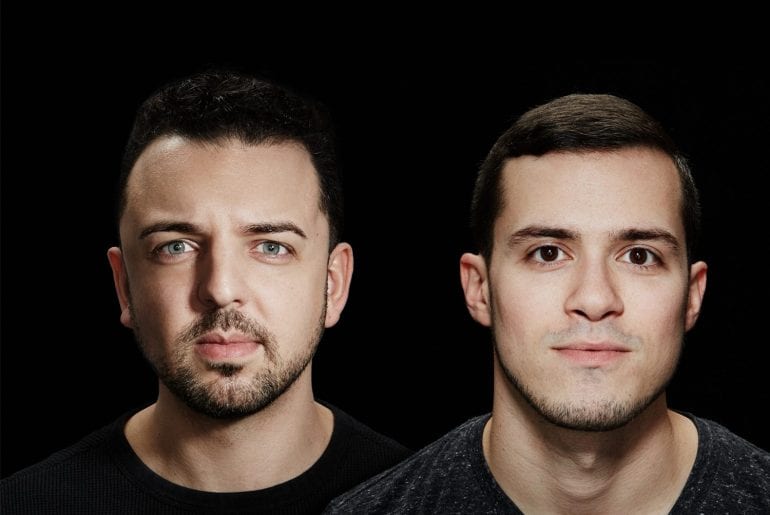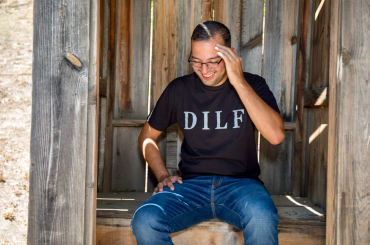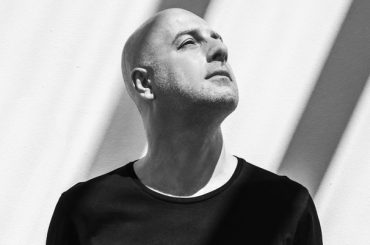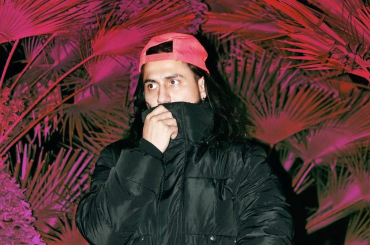Nick Ditri and Danny Boselovic, the DJ/production duo known as Disco Fries, didn’t spend their pandemic downtime merely flipping through Netflix options. Instead, the platinum-selling, chart-topping talents got down to business, as they came up with an idea that they believe will benefit remixer/producers, record labels and the music industry at large. Finish My Track, their new online music service, allows producers, promoters or label reps to do just that – finish their music with a resulting track that is market-ready for radio and/or club play. Users can visit FinishMyTrack.com and, for a fee, they can choose between four tiers that offer the following services: basic feedback and guidance; stereo mastering; stem mixing and mastering; and custom productions.
And it’s not like the guys don’t have the chops to deliver.
After meeting at Boston’s prestigious Berklee College of Music, Ditri and Boselovic gradually built their careers as in-demand remixer/producers and global DJs. For example, Disco Fries have served as official remixers for top acts like Selena Gomez, Flo Rida and Katy Perry, plus they’ve scored with hit productions like “Wasted” by Tiësto feat. Matthew Koma and “Concrete Heart,” a collab with VASSY. And now, Finish My Track is the next frontier.
DJ Times recently caught up with the pair of 34-year-old DJ/producers from their homes – Boselovic in Northern Virginia, Ditri in New Jersey.
DJ Times: Give me a quick synopsis on how you two began to work together?
Danny Boselovic: We both started at Berklee College of Music in Boston in 2004 and, by chance, were put in the same dorm room. My biggest influence at the time was Radiohead and Nick’s was probably Dr. Dre, so we didn’t click musically for a few years. Junior year, we started flipping ’80s rock records – “Heat of the Moment,” “Take Me Home Tonight,” etc. – and turning them into dance bootlegs. It really sparked something for us and we’ve been at it ever since.
DJ Times: What drew you to electronic music?
Nick Ditri: It was growing up listening to New York FM radio and hearing the “Saturday Night Dance Factory” sets on WKTU. I was too young to get into any of the New York clubs, but I definitely tuned in any time they were airing live late-night and picked up a ton of New York underground compilations when I was a kid. It introduced me to everything from Armand Van Helden and Todd Terry to Tiësto, and we draw a lot of inspiration from those artists to this day.
Boselovic: I’ve always been drawn to electronic/synthesized elements in music and listened to bands like Radiohead, Air, and Sigur Rós in high school. I wasn’t introduced to the commercial/pop side of electronic music until college, but quickly became a fan once I found artists like Tiësto, David Guetta and Benny Benassi.
DJ Times: What caught your ear?
Boselovic: Tiësto’s album Just Be was the first dance album I got, and that probably played the biggest role in sending down the path I’m on today. Tracks like “Adagio for Strings” and “Traffic” are classics that really got me excited about this kind of music. Later, David Guetta’s “Love Is Gone” and Benassi’s “Satisfaction” introduced me to electro sounds that would define a lot of our early music.
Ditri: Aside from dance music, I was heavy into hip hop growing up. It spoke to me in a different way than dance music and the eventual overlap of hip hop and dance music culture blew my mind when it happened. The G-Funk that came out of the West Coast really made me want to deep-dive into synthesis and make melodic records that weren’t just sample-based, like a lot of the beats that came before it. The minor tonality of a lot of those records and a lot of the classically driven hip hop definitely inspired some of the chord changes you hear in our records today.
DJ Times: When the pandemic hit, what were you guys up to?
Ditri: Prior to COVID March madness, we were working on a number of reworks of classic records in our style. We saw them resonating really well when we were playing out and wanted to do more records in line with our take on Mary J. Blige’s “Family Affair,” which came out on Spinnin’. Fortunately, because the process takes such a long time to clear records like that, we have a few in the bag that we’ll revisit when it’s time to fly again.
DJ Times: Did you have a busy DJ schedule?
Boselovic: We had just announced a string of dates, but one-by-one they all got postponed and then cancelled. One of our last gigs we got to do at the end of February was a support slot for Oliver Heldens in Atlanta, which was a really great one to go out on, even if we didn’t know it at the time.
Ditri: Late 2019 through 2020 was really set up to be something – we had kicked our touring back off the ground. We had joined up with a new agency last year and had a plan, but all of that got kicked to the curb for now. The best part of this entire thing has been being able to think of creative ways to navigate these times.
DJ Times: How did you spend the pandemic?
Boselovic: I’ve got a family, so I went full-time producer-dad mode. It’s been a really big adjustment and has definitely changed how and when I work. In some ways, though, when I’m restricted in how much time I get to be in the studio, I’m able to be more efficient with that time.
Ditri: The first few weeks almost felt like a vacation. Everyone I talked to in our business didn’t know what to do with their time and I was glued to the news for the first two weeks. But around that time, I just resigned myself to the idea that touring will “never” happen again and we discussed ways to pivot. It was around then that we came up with the premise for the new site, FinishMyTrack.com, and started our new, chill-side project, Overnight Oats.
DJ Times: Explain the idea behind Finish My Track.
Ditri: Finish My Track is aimed to help professional artists and songwriters elevate their songs so they are retail-ready. We felt like we were always getting involved in projects that were beyond the scope of just mixing and mastering. Tracks that were amazing songs, but lacked the right drop sound, right drums, or the entire soundset just didn’t fit, but the song was melodically sound so we started being “finishers” on a bunch of records. Swapping out patches, stem mixing, and drum replacement were some of the things that we were doing regularly for artists and we thought that there should be an affordable way for every-day artists to be able to get this service and help their output.
DJ Times: What kinds of clients are you getting?
Ditri: This idea isn’t something new for us and it’s something we did even on Tiësto’s projects when we worked with him. We’re credited producers on a number of those songs, but the songs themselves were largely written. We were brought in to lend our polish to the tracks and I think that really is the impetus of Finish My Track. Aside from Tiësto, we’ve done a slew of independent artists that have gone on to sign their records to Spinnin’, Armada, and Enhanced.
DJ Times: What’s the difference between this service and actual ghost-production?
Boselovic: I think there’s a stigma around the term ghost production that the artist isn’t actually doing anything. For Finish My Track, we’re usually focusing on taking people’s great ideas and bringing them to their full potential. If we’re brought a garbage track, there’s a good chance we’ll turn it down because we’re not really interested in polishing a turd to make a few bucks. We’d rather find the potential in a track and work with the artist to develop it into something everyone can be proud of. Or if the track is already full of awesome ideas then we just take on the role of mixing/mastering engineers to make it sound professional.
DJ Times: What are the common “mistakes” that you hear in the tracks that you are getting?
Ditri: I’d say the biggest two things is producers thinking they need to use their entire bag of tricks on a track and jam in every sound and melody idea that they have in a song, and addressing the low end in a track properly. In both hip hop and dance music, the low end mix and groove are the driving force behind the records and if they don’t knock right, no matter how cool the song is, it’s not going to impact the listener. Once we have stems in hand, we usually go through and cherry pick everything we feel is worth keeping, and mute anything that is secondary. Once you do that and get the song down to its bones, it’s easier to tell what you need and don’t need to maintain the energy and integrity of the record. Sometimes the low end needs a complete overhaul and other times it’s as simple as swapping out the kick. The right kick is the cornerstone of the record!
DJ Times: What’s your DJ set-up these days?
Boselovic: We started in Serato Scratch Live way back in the beginning. We stuck with that up until about two years ago, I’d say. Early on, we played so many open-format style rooms that we really found a lot of benefit to having the Serato interface. We had way more music loaded on the laptop than we’d ever need, but we could quickly pivot in any style and it lent itself to quick-mixing, which we did a lot of in those days. Now we’re on Pioneer DJ’s rekordbox and, in a lot of ways, it’s much easier. It takes the stress over set-up, watching over your laptop, and computer crashes out of the picture.
DJ Times: What are some of your go-to DJ tracks?
Ditri: For me, it’s always this mash-up we made many years ago using R3HAB & Deorro’s “Flashlight” and Ludacris’ “Move Bitch.” The blend of the high-energy drops and Ludacris’ iconic vocal always gets a reaction, without fail.
Boselovic: My go-to is an edit we did of three records from Galantis, Zedd, and Grey and our single “Family Affair,” which is a rework of the Mary J. Blige record from 2001.
DJ Times: In the studio, what’s your DAW?
Boselovic: I’m in Ableton Live 10 these days. Nick and I both started in Logic and used that for the first 10 years or so, but I find the workflow in Ableton really lends itself to working quickly. I always hated working with audio – vs. MIDI – in Logic because it felt clunky and over-complicated. Ableton Live is the total opposite and the way you can quickly chop up audio was a real selling point for me.
Ditri: Danny is a shortcut, key-command master in any program he tackles, so for him it’s now Ableton for the speed and efficiency. I’m still in Logic and am comfortable in it since we’ve been on that program for well over 10 years now. If it ain’t broke….
DJ Times: What are a few of your favorite plug-ins?
Boselovic: This changes every few months for me, but recently my favorites are Valhalla Supermassive [reverb/delay] – which is free, by the way – and FabFilter Pro-Q 3 [EQ]. Other new ones like Soundtheory’s Gullfoss EQ and oeksound’s soothe2 [dynamic resonance suppressor] are super-useful as well, and are interesting signs of what to expect from plug-ins these next few years.
DJ Times: Any hardware?
Boselovic: I wish, but I’m 100-percent in the box.
Ditri: Aside from this 88-key Korg Triton that’s now just an overpriced MIDI controller… that’s really the only piece of hardware I use regularly – but it’s just to trigger anything in the box.
DJ Times: For young DJ/producers, what advice would you give them on getting started?
Boselovic: Put in as much time as you can making music. If you get stuck on an idea, hop on YouTube or Twitch to watch some producers that inspire you – Oliver, Au5, and Virtual Riot are all ones I check out regularly – then bring that inspiration back into your work. There’s no shortcut to sounding good and getting noticed, so the burden is always on the producer to put in the hours.
Ditri: Test, fail and repeat over and over until you find your path. That goes for your songwriting, anything creative and anything you try on the business side of marketing yourself. You’ll never know what is going to be the thing that grabs the attention of a potential fan or that someone will gravitate toward. If you’re considering trying something, do it. The worst that can happen is that it doesn’t work and nobody sees or hears it, but in the off-chance it hits, it’s worth taking the shot.
DJ Times: How do you see the music scene/business bouncing back?
Ditri: The business is forever changed and, for better or worse, this accelerated and further exposed a lot of problems that already existed – and that’s not exclusive to the music industry. Artists were always underpaid… try being underpaid and in a pandemic where there’s no touring to make up for those lost royalties. I think you’ll see a lot more transparency from labels as they are being held accountable now more than ever. I don’t foresee massive changes coming to touring in the near future, but I think as we get deeper in 2021, that should come back… I’m hoping. With that, artists have a ton of time and angst right now and I believe the music that will come out from now to 2021 is going to be some of the best we’ve ever heard.
DJ Times: What’s next for Disco Fries?
Ditri: We’re really ramping up our Liftoff imprint this year into next and look forward to showcasing a ton of new artists. Helping artists see their vision from the ground up to a full release is one of our favorite things to do, so we’re looking to get behind a tremendous amount of music in the next year aside from our own.
DJ Times Magazine is copyright © 2020 by DJ Publishing, Inc. www.djtimes.com








